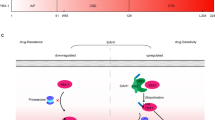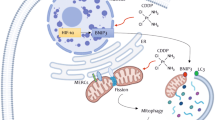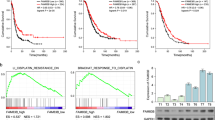Abstract
Although Akt is a determinant of cisplatin (cis-diaminedichloroplatinum (CDDP)) resistance in ovarian cancer cells, which is related in part to its inhibitory action on p53 activation, precisely how Akt confers CDDP resistance is unclear. In this study, we show that CDDP induced p53-dependent Fas-associated death domain-like interleukin-1β-converting enzyme (FLICE)-like inhibitory protein (FLIP) degradation in chemosensitive ovarian cancer cells but not their resistant counterparts. CDDP induced FLIP–p53–Itch interaction, colocalization and FLIP ubiquitination in chemosensitive but not chemoresistant ovarian cancer cells. Moreover, although activated Akt inhibited CDDP-induced FLIP degradation and apoptosis in sensitive cells, these responses were facilitated by dominant-negative Akt expression in chemoresistant cells. Inhibition of Akt function also facilitated p53–FLIP interaction and FLIP ubiquitination, which were attenuated by p53 silencing. These results suggest that Akt confers resistance, in part, by modulating CDDP-induced, p53-dependent FLIP ubiquitination. Understanding the precise etiology of chemoresistance may improve treatment for ovarian cancer.
This is a preview of subscription content, access via your institution
Access options
Subscribe to this journal
Receive 50 print issues and online access
$259.00 per year
only $5.18 per issue
Buy this article
- Purchase on Springer Link
- Instant access to full article PDF
Prices may be subject to local taxes which are calculated during checkout








Similar content being viewed by others
Abbreviations
- CDDP:
-
cis-diaminedichloroplatinum
- DED:
-
death effector domain
- DMEM:
-
Dulbecco's modified Eagle's medium
- DMSO:
-
dimethyl sulfoxide
- DN-Akt:
-
dominant-negative Akt
- FADD:
-
Fas-associated death domain
- FBS:
-
fetal bovine serum
- FLICE:
-
Fas-associated death domain-like interleukin-1β-converting enzyme
- FLIP:
-
FLICE-like inhibitory protein
- FLIPL:
-
long isoform of FLIP
- FLIPS:
-
short isoform of FLIP
- GAPDH:
-
glyceraldehyde phosphate dehydrogenase
- GFP:
-
green fluorescent protein
- MDM2:
-
murine double minute-2
- MOI:
-
multiple of infection
- PI3K:
-
phosphatidylinositol-3-OH-kinase
- PMSF:
-
phenylmethylsulfonyl fluoride
- RPMI-1640:
-
Roswell Park Memorial Institute 1640
- siRNA:
-
small interfering RNA
- SDS–PAGE:
-
SDS–polyacrylamide gel electrophoresis
- TP53:
-
tumor suppressor protein 53
- XIAP:
-
X-linked inhibitor of apoptosis protein
References
Abedini MR, Muller EJ, Brun J, Bergeron R, Gray DA, Tsang BK . (2008). Cisplatin induces p53-dependent FLICE-like inhibitory protein ubiquitination in ovarian cancer cells. Cancer Res 68: 4511–4517.
Abedini MR, Qiu Q, Yan X, Tsang BK . (2004). Possible role of FLICE-like inhibitory protein (FLIP) in chemoresistant ovarian cancer cells in vitro. Oncogene 23: 6997–7004.
Alladina SJ, Song JH, Davidge ST, Hao C, Easton AS . (2005). TRAIL-induced apoptosis in human vascular endothelium is regulated by phosphatidylinositol 3-kinase/Akt through the short form of cellular FLIP and Bcl-2. J Vasc Res 42: 337–347.
Buttitta F, Marchetti A, Gadducci A, Pellegrini S, Morganti M, Carnicelli V et al. (1997). p53 alterations are predictive of chemoresistance and aggressiveness in ovarian carcinomas: a molecular and immunohistochemical study. Br J Cancer 75: 230–235.
Chandrasekaran Y, McKee CM, Ye Y, Richburg JH . (2006). Influence of TRP53 status on FAS membrane localization, CFLAR (c-FLIP) ubiquitinylation, and sensitivity of GC-2spd (ts) cells to undergo FAS-mediated apoptosis. Biol Reprod 74: 560–568.
Chang L, Kamata H, Solinas G, Luo JL, Maeda S, Venuprasad K et al. (2006). The E3 ubiquitin ligase itch couples JNK activation to TNFalpha-induced cell death by inducing c-FLIP(L) turnover. Cell 124: 601–613.
Chen S, Liu X, Yue P, Schönthal AH, Khuri FR, Sun SY et al. (2007). CCAAT/enhancer binding protein homologous protein-dependent death receptor 5 induction and ubiquitin/proteasome-mediated cellular FLICE-inhibitory protein down-regulation contribute to enhancement of tumor necrosis factor-related apoptosis-inducing ligand-induced apoptosis by dimethyl-celecoxib in human non small-cell lung cancer cells. Mol Pharmacol 72: 1269–1279.
Cheng JQ, Jiang X, Fraser M, Li M, Dan HC, Sun M et al. (2002). Role of X-linked inhibitor of apoptosis protein in chemoresistance in ovarian cancer: possible involvement of the phosphoinositide-3 kinase/Akt pathway. Drug Resist Updat 5: 131–146.
Dan HC, Sun M, Kaneko S, Feldman RI, Nicosia SV, Wang HG et al. (2004). Akt phosphorylation and stabilization of X-linked inhibitor of apoptosis protein (XIAP). J Biol Chem 279: 5405–5412.
Fraser M, Bai T, Tsang BK . (2008). Akt promotes cisplatin resistance in human ovarian cancer cells through inhibition of p53 phosphorylation and nuclear function. Int J Cancer 122: 534–546.
Fraser M, Leung BM, Yan X, Dan HC, Cheng JQ, Tsang BK . (2003). p53 is a determinant of X-linked inhibitor of apoptosis protein/Akt-mediated chemoresistance in human ovarian cancer cells. Cancer Res 63: 7081–7088.
Fukazawa T, Fujiwara T, Uno F, Teraishi F, Kadowaki Y, Itoshima T et al. (2001). Accelerated degradation of cellular FLIP protein through the ubiquitin-proteasome pathway in p53-mediated apoptosis of human cancer cells. Oncogene 20: 5225–5231.
Hagopian GS, Mills GB, Khokhar AR, Bast Jr RC, Siddik ZH . (1999). Expression of p53 in cisplatin-resistant ovarian cancer cell lines: modulation with the novel platinum analogue (1R, 2R-diaminocyclohexane)(trans-diacetato)(dichloro)-platinum(IV). Clin Cancer Res 5: 655–663.
Kamarajan P, Sun NK, Chao CC . (2003). Up-regulation of FLIP in cisplatin-selected HeLa cells causes cross-resistance to CD95/Fas death signalling. Biochem J 376 (Pt 1): 253–260.
Li J, Feng Q, Kim JM, Schneiderman D, Liston P, Li M et al. (2001). Human ovarian cancer and cisplatin resistance: possible role of inhibitor of apoptosis proteins. Endocrinology 142: 370–380.
Li J, Sasaki H, Sheng YL, Schneiderman D, Xiao CW, Kotsuji F et al. (2000). Apoptosis and chemoresistance in human ovarian cancer: is Xiap a determinant? Biol Signals Recept 9: 122–130.
Mansouri A, Zhang Q, Ridgway LD, Tian L, Claret FX . (2003). Cisplatin resistance in an ovarian carcinoma is associated with a defect in programmed cell death control through XIAP regulation. Oncol Res 13: 399–404.
Mayo LD, Donner DB . (2001). A phosphatidylinositol 3-kinase/Akt pathway promotes translocation of Mdm2 from the cytoplasm to the nucleus. Proc Natl Acad Sci U S A 98: 11598–11603.
Meinander A, Söderström TS, Kaunisto A, Poukkula M, Sistonen L, Eriksson JE . (2007). Fever-like hyperthermia controls T Lymphocyte persistence by inducing degradation of cellular FLIPshort. J Immunol 178: 3944–3953.
Milne D, Kampanis P, Nicol S, Dias S, Campbell DG, Fuller-Pace F et al. (2004). A novel site of AKT-mediated phosphorylation in the human MDM2 onco-protein. FEBS Lett 577: 270–276.
Moriyama H, Yonehara S . (2007). Rapid up-regulation of c-FLIP expression by BCR signaling through the PI3K/Akt pathway inhibits simultaneously induced Fas-mediated apoptosis in murine B lymphocytes. Immunol Lett 109: 36–46.
Moumen A, Ieraci A, Patané S, Solé C, Comella JX, Dono R et al. (2007). Met signals hepatocyte survival by preventing Fas-triggered FLIP degradation in a PI3k-Akt-dependent manner. Hepatology 45: 1210–1217.
Muller E, Triller A, Legendre P . (2004). Glycine receptors and GABA receptor alpha 1 and gamma 2 subunits during the development of mouse hypoglossal nucleus. Eur J Neurosci 20: 3286–3300.
Nam SY, Amoscato AA, Lee YJ . (2002). Low glucose-enhanced TRAIL cytotoxicity is mediated through the ceramide-Akt-FLIP pathway. Oncogene 21: 337–346.
Nam SY, Jung GA, Hur GC, Chung HY, Kim WH, Seol DW et al. (2003). Upregulation of FLIP(S) by Akt, a possible inhibition mechanism of TRAIL-induced apoptosis in human gastric cancers. Cancer Sci 94: 1066–1073.
Panka DJ, Mano T, Suhara T, Walsh K, Mier JW . (2001). Phosphatidylinositol 3-kinase/Akt activity regulates c-FLIP expression in tumor cells. J Biol Chem 276: 6893–6896.
Poukkula M, Kaunisto A, Hietakangas V, Denessiouk K, Katajamäki T, Johnson MS et al. (2005). Rapid turnover of c-FLIPshort is determined by its unique C-terminal tail. J Biol Chem 280: 27345–27355.
Sasaki H, Sheng Y, Kotsuji F, Tsang BK . (2000). Down-regulation of X-linked inhibitor of apoptosis protein induces apoptosis in chemoresistant human ovarian cancer cells. Cancer Res 60: 5659–5666.
Schneiderman D, Kim JM, Senterman M, Tsang BK . (1999). Sustained suppression of Fas ligand expression in cisplatin-resistant human ovarian surface epithelial cancer cells. Apoptosis 4: 271–281.
Shayesteh L, Lu Y, Kuo WL, Baldocchi R, Godfrey T, Collins C et al. (1999). PIK3CA is implicated as an oncogene in ovarian cancer. Nat Genet 21: 99–102.
Shim E, Lee YS, Kim HY, Jeoung D . (2007). Down-regulation of c-FLIP increases reactive oxygen species, induces phosphorylation of serine/threonine kinase Akt, and impairs motility of cancer cells. Biotechnol Lett 29: 141–147.
Skurk C, Maatz H, Kim HS, Yang J, Abid MR, Aird WC et al. (2004). The Akt-regulated forkhead transcription factor FOXO3a controls endothelial cell viability through modulation of the caspase-8 inhibitor FLIP. J Biol Chem 279: 1513–1525.
Stärck L, Scholz C, Dörken B, Daniel PT . (2005). Costimulation by CD137/4-1BB inhibits T cell apoptosis and induces Bcl-xL and c-FLIP(short) via phosphatidylinositol 3-kinase and AKT/protein kinase B. Eur J Immunol 35: 1257–1266.
Suhara T, Mano T, Oliveira BE, Walsh K . (2001). Phosphatidylinositol 3-kinase/Akt signaling controls endothelial cell sensitivity to Fas-mediated apoptosis via regulation of FLICE-inhibitory protein (FLIP). Circ Res 89: 13–19.
Sun M, Wang G, Paciga JE, Feldman RI, Yuan ZQ, Ma XL et al. (2001). AKT1/PKBalpha kinase is frequently elevated in human cancers and its constitutive activation is required for oncogenic transformation in NIH3T3 cells. Am J Pathol 159: 431–437.
Yang X, Fraser M, Moll UM, Basak A, Tsang BK . (2006). Akt-mediated cisplatin resistance in ovarian cancer: modulation of p53 action on caspase-dependent mitochondrial death pathway. Cancer Res 66: 3126–3136.
Zhou BP, Liao Y, Xia W, Zou Y, Spohn B, Hung MC . (2001). HER-2/neu induces p53 ubiquitination via Akt-mediated MDM2 phosphorylation. Nat Cell Biol 3: 973–982.
Zou W, Chen S, Liu X, Yue P, Sporn MB, Khuri FR et al. (2007). c-FLIP downregulation contributes to apoptosis induction by the novel synthetic triterpenoid methyl-2-cyano-3, 12-dioxooleana-1, 9-dien-28-oate (CDDO-Me) in human lung cancer cells. Cancer Biol Ther 6: 1614–1620.
Acknowledgements
This work was supported by grants from the Cancer Research Society (# 11181 to BKT) and the Canadian Institutes of Health Research (#MOP-79360 to RB), the WCU (World Class University) program through the Korea Science and Engineering Foundation funded by the National Research Foundation of Korea (R31-10056) and a New Investigator Award to RB. MRA was the recipient of a Ministry of Health and Medical Education Scholarship, Iran. We thank Dr Qiao Li (University of Ottawa, Canada) and Dr Kenneth Walsh (St Elizabeth's Medical Centre, Boston, MA, USA) for providing HA-tagged ubiquitin and adenoviral HA-tagged DN-Akt, respectively. A2780s-AAkt2 and A2780s-PHM6 cells were generously provided by Dr Jin Cheng (H Lee Moffitt Cancer Center and Research Institute, Tampa, FL, USA).
Author information
Authors and Affiliations
Corresponding author
Rights and permissions
About this article
Cite this article
Abedini, M., Muller, E., Bergeron, R. et al. Akt promotes chemoresistance in human ovarian cancer cells by modulating cisplatin-induced, p53-dependent ubiquitination of FLICE-like inhibitory protein. Oncogene 29, 11–25 (2010). https://doi.org/10.1038/onc.2009.300
Received:
Revised:
Accepted:
Published:
Issue Date:
DOI: https://doi.org/10.1038/onc.2009.300
Keywords
This article is cited by
-
CircNUP50 is a novel therapeutic target that promotes cisplatin resistance in ovarian cancer by modulating p53 ubiquitination
Journal of Nanobiotechnology (2024)
-
The regulation of plasma gelsolin by DNA methylation in ovarian cancer chemo-resistance
Journal of Ovarian Research (2024)
-
Cut-like homeobox 1 (CUX1) tumor suppressor gene haploinsufficiency induces apoptosis evasion to sustain myeloid leukemia
Nature Communications (2021)
-
The exosome-mediated autocrine and paracrine actions of plasma gelsolin in ovarian cancer chemoresistance
Oncogene (2020)
-
ITCH-dependent proteasomal degradation of c-FLIP induced by the anti-HER3 antibody 9F7-F11 promotes DR5/caspase 8-mediated apoptosis of tumor cells
Cell Communication and Signaling (2019)



